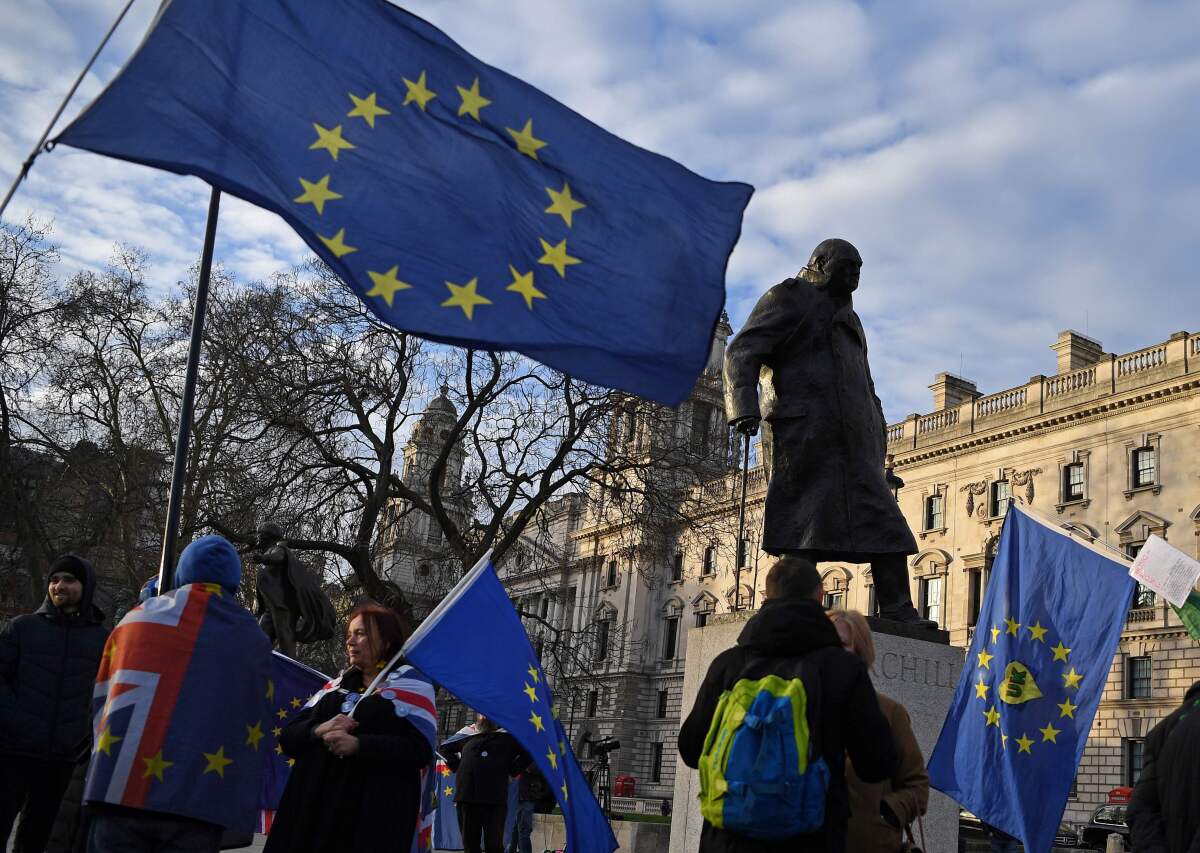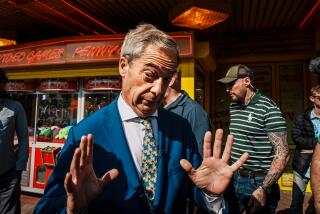For a weary Britain, split from Europe lands ‘with a rather dull thud’

LONDON — When Britain departs the European Union on Friday, it will be a moment of paradox: a historic rupture with profound implications for the postwar order — but one that will have very little tangible effect on people’s daily lives.
Not yet, at any rate.
Brexit — a flippant-sounding coinage that became a drama of Shakespearean proportions, a bitter national quarrel that sundered families and friendships, a synonym for political discord and dysfunction — will finally take formal effect at 11 p.m. London time, which is midnight in Brussels, the site of EU headquarters.
There’ll be rejoicing in some quarters, and sorrow and anger in others. Nearly 43 months after the country’s narrow vote to leave the EU, though, the overriding sentiment is probably fatigue.
“British constitutional history is being made, undoubtedly,” said Matthew Flinders, a politics professor at the University of Sheffield. But it is landing, he said, “with a rather dull thud.”
On the surface, much will look the same in the wake of the official split. A transition period will last for the rest of this year, during which free trade and free movement between Britain and the EU will continue.
The United Kingdom will remain within the bloc’s customs union and single market; it will continue to abide by EU rules and pay into the bloc’s budget — though without representation in the European Parliament.
Critics inside and outside the United Kingdom, though, are already warning that 11 months is not nearly enough time for Prime Minister Boris Johnson’s government to negotiate a complex new relationship with the EU, encompassing not only trade but a host of intertwined interests from fisheries to aviation protocols to law enforcement.
Johnson has ruled out any extension of the transition period, and the EU’s chief negotiator, Michel Barnier, warned that failure to reach an accord by year’s end — and a British refusal to negotiate any extension — could result in exactly the type of chaotic and economically damaging “crash-out” that the current withdrawal accord was intended to stave off.
“Brexit is not going to go away,” Barnier said this week on a visit to Ireland.
For some in Britain, leaving the bloc marks a celebration of sovereignty, a purposeful assertion of pride and patriotism. But for others, it amounts to a willful act of social and economic vandalism that will end Britons’ right to freely work and live in the remaining 27 EU countries, and disrupt ties with a sprawling free-trade zone encompassing half a billion people.
The June 2016 Brexit referendum was closely fought, with 52% voting to leave the EU and 48% voting to remain. Not surprisingly, the warring sides have found little common ground on how to commemorate the moment when Britain and the EU go their separate ways.
There was a last-minute spat over whether to hurry ahead with an expensive renovation project, begun in 2017, so that Big Ben — the nickname for the iconic bell inside the tower atop the Palace of Westminster, which had to be silenced for the repairs — could be rung to mark the hour of Brexit. After Johnson’s government balked at the cost of a temporary one-night fix, estimated at $650,000, the Leave camp grudgingly agreed to make do with a recording.
While many Remain adherents planned to duck into a pub for a mournful pint or simply stay home, Leave aficionados will be able to track the final moments in the EU — whose precursor organization Britain joined in 1973 — with a countdown clock projected onto the facade at 10 Downing Street, the prime minister’s official residence. Other observances are to include a light show and celebratory speeches.
The biggest Brexit gadfly might be Nigel Farage, whose Brexit Party handily won Britain’s elections last year to the European Parliament. He said nothing delighted him more than packing his bags to leave Brussels, giving up the parliamentary seat he has held since 1999.
“I will be leaving here very happy that I’ve achieved my political goal,” he said in a radio interview Wednesday. “We are absolutely doing the right thing — I have no doubt about that.”
Ignoring a years-long barrage of insults directed at them by Farage and his allies, European parliamentarians offered a gracious sendoff, serenading the departing Brits with a chorus of “Auld Lang Syne.”
The pro-Brexit British prime minister, for his part, appeared anxious to avoid the appearance of unseemly gloating. Johnson, who was able to push his withdrawal deal through Parliament after his Conservative Party’s decisive victory in December’s general elections, was to make a television address Friday evening centered on themes of reconciliation and unity.
The specter of disunity, however, is looming large among the four nations that make up the United Kingdom. The imminent break is stirring separatist sentiment in Scotland, whose citizens voted against leaving the EU. Hours before the formal departure, Scotland’s First Minister Nicola Sturgeon was set to make a speech outlining steps toward “Scotland’s future as an independent country.”
Johnson has already moved to quash any independence referendum, saying Scotland’s 2014 vote to remain part of the U.K. should stand.
Brexit is also prompting deep worries in Ireland, which remains part of the EU, and Northern Ireland, which will exit the bloc along with the rest of the United Kingdom. An open border between the two is a cornerstone of the 1990s Good Friday peace accords that stemmed decades of sectarian bloodletting.
The British prime minister has promised not to implement a “hard” Irish border on the island, which would include customs posts and other infrastructure that many believe would undermine the Good Friday agreement. But without a physical border between the EU (Ireland) and the U.K. (Northern Ireland), Johnson has not explained how he will avoid customs checks on goods passing by sea between mainland Britain and Northern Ireland. Mainly Protestant unionists in the north say instituting such checks would weaken their connection to the rest of the U.K.
Angst is growing, too, among the roughly 3 million EU nationals currently living and working visa free in the U.K., and some 1 million British citizens who live in the bloc. Both the British government and EU officials say their rights will be protected, but social media brim with accounts of longtime residents on both sides who whose initial encounters with the bureaucracy suggest that home perhaps isn’t home after all.
Going forward, Johnson has said he plans to introduce a points-based visa system to vet anyone wishing to be allowed into Britain.
Another big unanswered question is the future trade relationship of Britain and the United States. President Trump — a longtime Brexit cheerleader — has boasted in advance that a “massive” partnership with the U.S. would offset the economic hit of disruption with Britain’s biggest trading partner, Europe.
But many fear that if London’s negotiations with the bloc should founder, the U.S. leader will swiftly move into predatory mode, demanding concessions that would be unpalatable to the British public, particularly regarding food safety and the flawed but revered National Health Service. Despite the so-called special relationship between the U.S. and Britain, Trump has repeatedly threatened European allies with automobile tariffs, which could hit the British car industry hard.
Once Brexit is formally enacted, young Britons who grew up taking for granted that they could live or study anywhere in Europe say they see a narrowing of their horizons, even though freedom of movement remains in place this year. Brexit exposed a vast generational divide: In the 2016 referendum, a YouGov poll estimates that 71% of voters under 25 favored remaining in the EU, compared with only 36% of voters 65 and over.
Lara Spirit, a student at Cambridge University, dropped out of school two years ago to campaign full time for a second Brexit referendum, co-founding a group called Our Future, Our Choice. But with hopes dashed by Johnson’s big election win and the imminent EU departure, the group has disbanded, and she is now back in the classroom.
“We’ve lost, and there is a lot of reflection,” she said. “I think we did manage to focus the conversation for the younger generation, but it’s a sad time.”
Special correspondent Boyle reported from London and staff writer King from Washington.
More to Read
Sign up for Essential California
The most important California stories and recommendations in your inbox every morning.
You may occasionally receive promotional content from the Los Angeles Times.










